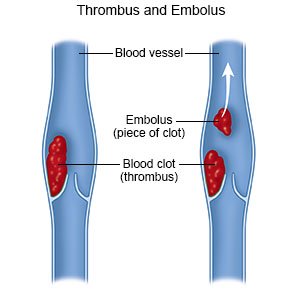Cardiac Thrombolysis
Medically reviewed by Drugs.com. Last updated on Aug 4, 2025.
What do I need to know about cardiac thrombolysis?
Cardiac thrombolysis is a procedure to dissolve or break up a blood clot near your heart. The clot may be removed with a device during the procedure. A clot that forms in the arteries or chambers of the heart can cause a heart attack. The clot can cause a stroke if it breaks off and travels to your brain. Thrombolysis needs to be done as quickly as possible to prevent heart damage or a stroke.
 |
How do I prepare for the procedure?
Cardiac thrombolysis is often an emergency procedure. This means you may not have time to prepare for it. The following is general information if you have time to prepare:
- Your healthcare provider will tell you how to prepare for your procedure. He or she may tell you not to eat or drink anything after midnight on the day of your procedure. Arrange to have someone drive you home when you leave the hospital.
- Tell your provider about all your current medicines. He or she will tell you if you need to stop any medicine for the procedure, and when to stop. He or she will tell you which medicines to take or not take on the day of your procedure.
- Tell your provider about any allergies you have, including to anesthesia, contrast liquid, or medicines. You may be given an antibiotic to help prevent an infection caused by bacteria. You may be given contrast liquid before or during the procedure to help the clot show up in pictures.
- You may need blood tests and a stress test before your procedure. Talk to your provider about these or other tests you may need.
Related medications
What will happen during the procedure?
- You may be given local anesthesia to numb the procedure site. With local anesthesia, you may still feel pressure or pushing, but you should not feel any pain. You may instead be given general anesthesia to keep you asleep and free from pain.
- Your healthcare provider will inject medicine into your IV that will help dissolve or break up the clot. It is most often given into a vein, but it may be given into an artery. If the medicine is given into an artery, a catheter is guided by x-ray so it is near the blood clot.
What should I expect after the procedure?
Healthcare providers will apply pressure on the procedure site to stop any bleeding. You will be monitored closely for any problems. Do not get out of bed until your healthcare provider says it is okay. You will then be taken to your hospital room.
- You will be helped to walk around after the procedure. Movement will help prevent blood clots. You may also be given exercises to do in bed. Do not get out of bed on your own until your healthcare provider says you can. Ask before you get up the first time. You may need help to stand up safely. When you are able to get up on your own, sit or lie down right away if you feel weak or dizzy. Then press the call button to let someone know you need help.
- Medicines:
- Anticoagulants are a type of blood thinner medicine that helps prevent clots. Anticoagulants may cause you to bleed or bruise more easily.
- Antiplatelets help prevent blood clots. This medicine makes it more likely for you to bleed or bruise.
What are the risks of cardiac thrombolysis?
Thrombolysis increases your risk for bleeding. You may have increased nosebleeds or bleeding from your gums. You may also have bleeding in your stomach or brain. Bleeding can become severe and life-threatening. If the clot is removed, the device used may cause an irregular heartbeat.
Care Agreement
You have the right to help plan your care. Learn about your health condition and how it may be treated. Discuss treatment options with your healthcare providers to decide what care you want to receive. You always have the right to refuse treatment. The above information is an educational aid only. It is not intended as medical advice for individual conditions or treatments. Talk to your doctor, nurse or pharmacist before following any medical regimen to see if it is safe and effective for you.© Copyright Merative 2025 Information is for End User's use only and may not be sold, redistributed or otherwise used for commercial purposes.
Learn more about Cardiac Thrombolysis
Care guides
Further information
Always consult your healthcare provider to ensure the information displayed on this page applies to your personal circumstances.
